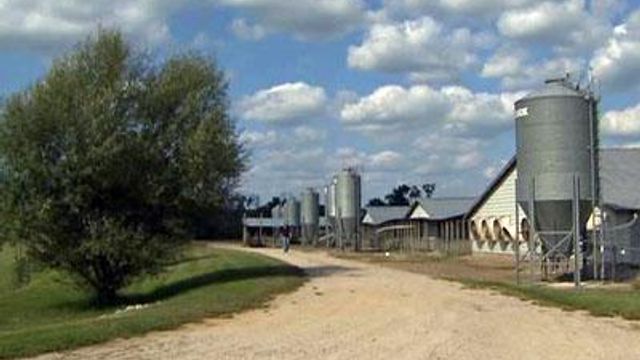Hog farms face tough times
About 25 hog farms in North Carolina sit idle and another eight are on the brink of closing, according to NC Pork Council Chief Executive Officer Deborah M. Johnson.
Posted — UpdatedAbout 25 hog farms in North Carolina sit idle and another eight are on the brink of closing, according to Deborah M. Johnson, CEO of the NC Pork Council.
“It’s extreme. We’re just trying to stay in business. I’m struggling and the big guys are struggling,” Strother said.
Farms started seeing problems about two years ago when hog feed prices soared as the need for grain expanded to make bio-fuels. Then the economic crisis made it nearly impossible to pass those costs on to consumers.
Earlier this year, the H1N1 virus, also known as the swine flu, also caused problems for the industry.
“If we could get people talking about H1N1 and stop using that awful term swine flu and get rid of it, and let consumers know pork is safe to eat, that would help us as well,” Johnson said.
Hog prices have remained steady. Costs are up, exports are down, but profits are dwindling.
“It’s dangerous for rural communities to threaten their incomes,” said Kelly Zering, an associate professor of agriculture and economics at North Carolina State University.
Zering said the decline in hog farms can be blamed for $1 billion of the state’s economic downtown.
“Demand for meat is expected to rise by 50 percent, and the big question is, ‘Can we maintain the productivity growth in agriculture so that prices for food do not rise in this country to the point where people start to suffer?’” Zering said.
On Strother's farm, the questions don't have easy answers.
“The option of just throwing the hands up and just walking away from it, that's not an option for any of us in this business,” Strother said. “A few have to do it, but that means a lot of people will be out of a job."
Strother said farm hands, truckers and even pharmaceutical companies are affected when hog farms shut down. He said the impact to local economies could be devastating.
Johnson was in Washington D.C. on Monday to discuss the problems North Carolina hog farms face with congressional staff.
Last week, members of the U.S. House of Representatives and U.S. Senate signed a letter to USDA Secretary Tom Vilsack in support of pork producers.
The letter outlined economic hardships faced by pork producers and requested the USDA purchase additional pork for federal food programs and work with agencies to address swine disease surveillance on farms.
• Credits
Copyright 2024 by Capitol Broadcasting Company. All rights reserved. This material may not be published, broadcast, rewritten or redistributed.





